Jeff Mack’s Marcel’s Masterpiece
 August 11th, 2022 by jules
August 11th, 2022 by jules
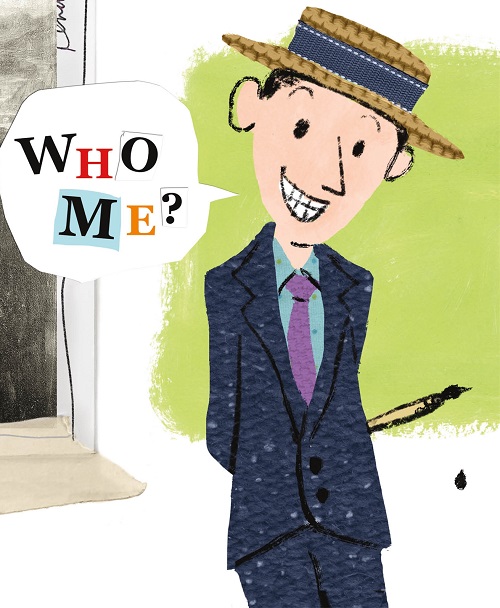
Author-illustrator Jeff Mack takes on some big questions in his newest picture book, Marcel’s Masterpiece: How a Toilet Shaped the History of Art (Henry Holt, August 2022): “How can we tell when something is art or when it isn’t? Who gets to decide?” And he poses these questions by way of this one: “Can a toilet really be art?”
This is the story of Dadaist and conceptual artist Marcel Duchamp’s decision in 1917 to purchase a urinal, sign it, turn it upside down, and submit it to an art showing. In tremendously appealing ways, Mack makes this story accessible to the youngest of readers. The sentences are short, with Mack incorporating speech-bubble dialogue that includes collaged, multicolored letters. The visuals are bold and textured; a note on the copyright page says Mack created the art with “acrylic and watercolor paint, digital ‘ink,’ torn paper, cardboard, fabric, tape, string, wooden boxes, cotton balls, and whatever else I could find around the house.” And, most of all, a complicated topic — the gatekeeping of art and what makes something art — is presented in a way that young children can understand, because Mack reduces the story to its very essentials. In other words, elementary art teachers: Get this one for your classrooms, and get it pronto.
Mack kicks it all off (pictured below) with a few examples of Duchamp’s unconventional behavior and then gets right to his trip to a toilet store. This is one of the many instances in the book of punny, dry humor: “COME TO DADA!” says Duchamp when he sees the urinal he knows he wants to purchase. He takes it home and studies it: “Something’s not quite right.” It’s then that he decides to turn it upside-down and turn it into a “fountain.”
The spreads in which we see Duchamp’s friend (in the backmatter we read it’s Baroness Elsa von Freytag-Loringhoven) place the urinal on a pedestal in the gallery are laugh-out-loud funny, what with the presence of three old, white men who stand nearby; they seem to serve as no less than the tastekeepers of all art. The dialogue from these men in their top hats, as Marcel’s friend sneaks behind them with the boxed urinal, is gold: “This will be our fanciest art show yet” and “Only the fanciest art in our show.” In fact, the banner hanging above the street-facing door at the gallery announces: “fancy art show” (this is used elsewhere in the book too), Mack using these exaggerated stances on art to make the point that what gets canonized into “art” is a complicated and multilayered thing.
These aristocratic men know that all art is supposed to be welcome, so they merely cover up the piece, hoping “it would go away.” But it is spotted and makes the news. (Evidently, the piece was actually excluded from the show.) You know the rest of this story from the history books — or, er, Wikipedia. Soon after this point in the book (insert more dry humor about toilets and art-viewing), Mack depicts a modern-day classroom of students, whose teacher asks them: “Can a toilet really be art?” The book’s backmatter — four glorious spreads — dive a bit deeper into Duchamp and his philosophy on art (“Anything is art if an artist says it is”), Dadaism, Duchamp’s idea of “readymades,” and much more.
(Click spread to enlarge and read text in its entirety)

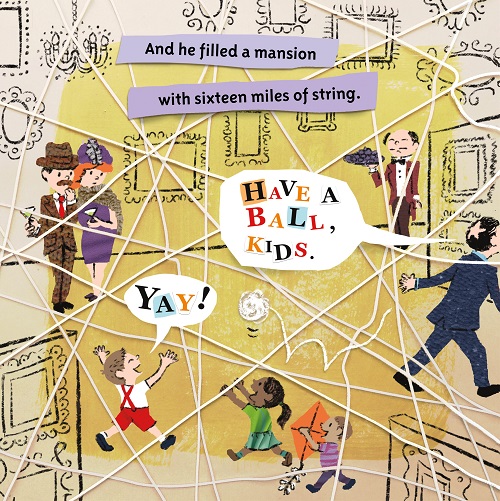
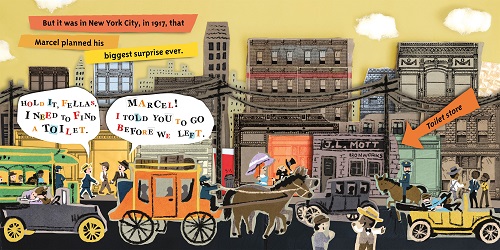
(Click spread to enlarge and read text in its entirety)
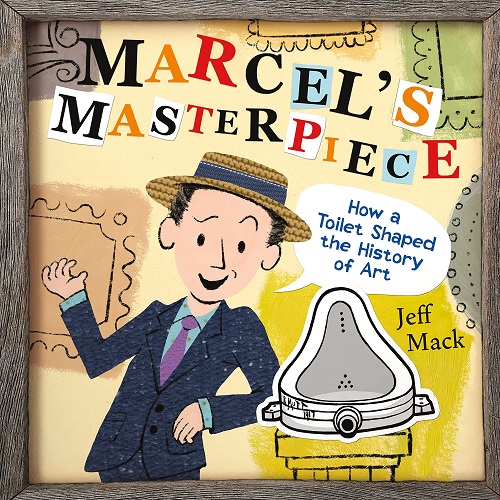
MARCEL’S MASTERPIECE: HOW A TOILET SHAPED THE HISTORY OF ART. Copyright © 2022 by Jeff Mack. Illustrations reproduced by permission of the publisher, Henry Holt and Company, New York.
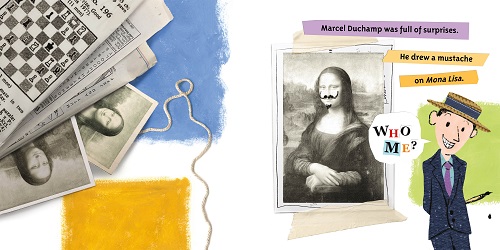

Just shot a recommendation to art teacher. Thank you, Julie! Keep it comin’!